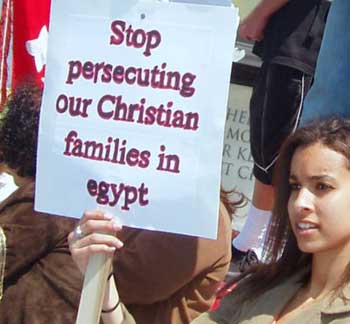Editors’ Note:
Dr. Alexander Moens is a professor of political science at Simon Fraser University and attends the Bethel Reformed Congregation of Chilliwack, British Columbia. A long-time supporter of pro-life initiatives, he spoke at the launch of the New Abortion Caravan in 2012 and has written on the issue as well. Dr. Moens is involved with a number of organizations that seek to support persecuted Christians worldwide, and kindly agreed to write an analysis of the persecution of Christians around the globe for The Reformed Pro-Lifer.
The liberty and order we experience most days in constitutional democratic countries derives from three ingredients: religious, economic, and political freedom. While the latter two are frequent topics of study and literature, the first one is often undervalued even forgotten. It is religious freedom that is under tremendous threat in the world today and scarcely getting the attention it warrants.
What we now call human rights and civil liberties as summarized by the freedom of the individual human being to think, write, and assemble freely has historically been associated closely with religious freedom. The Reformation struggle against the mixture of church and state power assumed by Roman Catholic dogma was one of the key pillars of the development of Western political freedom. In many subsequent struggles, Baptists, Methodists, and Mennonites had in turn to insist on their freedom in the face of dominant protestant denominations such as the Anglican and Reformed churches.
After the end of the Cold War in the early 1990s and the subsequent decline of Soviet-supported communism, the battle of religion has opened up afresh. This time, it is waged mainly by Muslims against Christians and by Muslims against other Muslims. The latter is not insignificant. For example, Sunni Muslims of Wahhabi and Salafi persuasions are systematically discriminating Shia Muslims in Saudi Arabia and in many of the Persian Gulf states such as Bahrain. Also, in various North African states, Salafi hard-liners treat the more moderate Sufi persuasion of Islam harshly. Some Sufi communities are forced to adopt the Salafi view at gunpoint. Shia Muslims, in turn, oppress minorities in their communities and countries, for example the Ismailis in Iran. Often forgotten is the fact that Muslims who become Christian, the so-called Muslim Background Believers or MBBs, suffer the most vehement sort of rejection and violence of all religious people.
There is also less widespread religious persecution of Christians by radicalized Hindus in northern parts of India. Recently, some Sinhalese Buddhists are using the newly found peace in Sri Lanka as a way to push out Christian communities. In Myanmar, dominant Buddhist groups are putting pressure on both minority Christians and Muslims. In Nepal, Buddhists have been trying to keep Christians out for decades.
However, in terms of overall challenge, in terms of scale and amount of people and countries impacted, there is nothing in the world that compares to the wide-spread discrimination, oppression and persecution of Christians, including MBBs.
The Hudson Institute in Washington, D.C., regularly publishes a map and index on the sixty-odd countries in which Christian persecution takes place. Its recent report is titled “The Global Assault on Christians.” Many Non- Governmental Organizations (NGOs) find evidence to substantiate these findings. Two of these with regular Canadian publications are ‘Open Doors‘ and ‘Voice of the Martyrs‘. The bulk of the problem is taking place in Africa, the Middle East and Asia. Most of this assault takes place at the hands of Muslim individuals, communities and governments. In East Asia, the persecution of Christians shifts to the hands of militaristic and ideological governments such as in North Korea and various parts of China, Laos, Cambodia and Vietnam. Geographically, the persecution of Christians looks like a wide arch that begins in West Africa and draws through the Middle East to the very end of Asia with the many “Stans” such as Uzbekistan in the north and Malaysia and Indonesia in the south. Over 200 million people in more than 60 countries are experiencing a form of persecution for being Christian.
In Islamic countries Christians face a three-fold source of discrimination, oppression and persecution. Typically, ancient Christian minorities such as Armenian or Assyrian Christians are left alone provided they do not practice any form or missionary activity. At the same time, they suffer from systematic low-level discrimination. For example, they are not given building permits to fix or build churches. The problem really starts with the wide-spread Muslim practice that sharing the Gospel or becoming a Christian is a capital offence in Islam. This turns fathers, brothers and uncles into literal revenge killers in many families. The second, and growing threat, is what can be called the mob of the Mosque. In many communities the teachers of the Mosques (the imams) set the crowd on edge against some alleged—often false or fabricated—charges against Christians in the community. The enraged mob goes out and executes rough street ‘justice’ to the accused Christian individual, family or community. This is how many Christians perish in Pakistan or find their homes burned down. For simply defending with words her faith in Christ during a work-place conversation, Asia Bibi has found herself in a Pakistani jail for years now.
The third layer of trouble depends on each state and how much of its administration of justice is influenced by religious versus Liberal constitutional principles. Here the battle between Sharia Law and Western Law is of crucial importance. For example, in Egypt, local police forces and the courts themselves are often afraid to defend non-Muslim Brotherhood beliefs. Muslim background Believers in Egypt find themselves outlaws. The police and courts will not protect them but rather make things worse. Even the Coptic Christians, traditionally a protected community in law in Egypt is experiencing an erosion of its protection. A Canadian Parliamentary report recently has highlighted the many points of discrimination and oppression faced by Copts.

